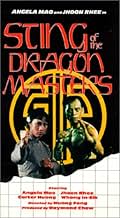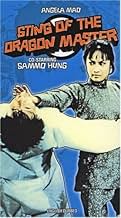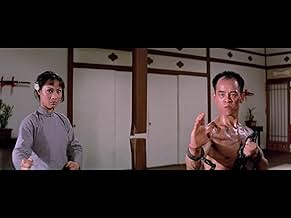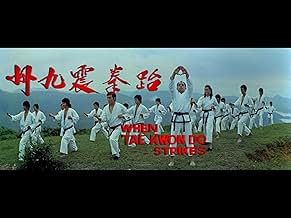Adicionar um enredo no seu idiomaDuring the Japanese occupation of Korea, the leader of a resistance movement, who's also a Taekwondo master, and his apprentices struggle against the brutal Japanese occupiers, aided by a Ch... Ler tudoDuring the Japanese occupation of Korea, the leader of a resistance movement, who's also a Taekwondo master, and his apprentices struggle against the brutal Japanese occupiers, aided by a Chinese female martial artist.During the Japanese occupation of Korea, the leader of a resistance movement, who's also a Taekwondo master, and his apprentices struggle against the brutal Japanese occupiers, aided by a Chinese female martial artist.
- Direção
- Roteirista
- Artistas
Carter Wong
- Jin Zheng Zhi
- (as Carter Huang)
Avaliações em destaque
I first saw "When Taekwondo Strikes" over twenty years ago via a panned and scanned (and dubbed) VHS copy, and at the time I didn't think too much of it. But recently I got the opportunity to see it again this time with an anamorphic widescreen DVD edition that had the original Mandarin track and English subtitles. This better edition may explain why my feelings about the movie improved. Certainly, the movie is not perfect. It has some of the clichés associated with old school kung fu movies (chortling villains, exaggerated sound effects, etc.) There's not a terrible amount of plot, which results in some lengthy slow spots. And the Japanese villains could have been made into stronger opponents instead of being shown to be (mostly) hopeless. On the other hand, despite the largely one-sided fights, the martial arts scenes aren't too bad, having excitement and coming across as fairly believable. Angela Mao makes for a charismatic protagonist, and there's fun seeing a pre- fame Sammo Hung as one of the villains. I'm generally not a fan of old school Hong Kong marital arts movies, but I have to admit that this one was, despite its flaws, definitely above average.
The DVD version released by Crash Cinema was very poorly done. The mastering engineer must have been either drunk, asleep or not even in the room while it was being done. It looks like it was mastered from about a tenth generation copy and about halfway through the film, the audio synchronization disappears. The dialog is about 10 or 15 seconds behind the audio. If you're thinking about purchasing this DVD, please save your money. I remember seeing this film at the theater back in 1973. Also, the VHS copy of this film under the title of "When Taekwondo Strikes" looks better than the DVD, but the remaining several minutes of the movie are "missing". Where is the original camera negative?
"Sting of the Dragon Masters" features Jhoon Rhee in his only martial arts film role. Rhee, who is known as the 'Father of American Tae Kwon Do' and counts Muhammad Ali among his students, plays a humble, unassuming man living in Japanese-occupied Korea in the early twentieth century. He makes every effort to conceal his martial skill, but is eventually forced to lash out against the Japanese oppressors. (In this regard, and also because it is a Golden Harvest production, "...Dragon Masters" bears more than a passing resemblance to Bruce Lee's "The Chinese Connection".) Fighting alongside Rhee are chop-socky stalwarts Angela Mao Ying and Carter Wong, while the seemingly endless array of villains includes Whang Ing-Sik (dressed in a very loud kimono) and Sammo Hung. As is the case with many martial arts films, the storyline is simple and exists primarily to link the fight scenes together. But, good god, what fight scenes they are! "Sting of the Dragon Masters" offers spectacular, jaw-dropping action, with a special focus on kicks (as you might expect from a film whose alternate title is "When Tae Kwon Do Strikes"), and you'll certainly feel that you've gotten your money's worth by the time the closing credits roll.
I won't waste your time by describing the plot for this, the other reviewer already did this quite well. I will however give you my opinion of this movie. This movie is basically anti japanese propoganda. The japanese are portrayed as incredably evil b**tards who have respect for nothing, as well as having very poor martial arts skills (groups of japanese men get there asses kicked by single women on more than one occasion.) The fact that the japanese fighters lose almost every (if not every) fight in the movie kind of takes away the suspense. The plot is actually quite solid and perfect for a kung fu movie though. The problem lies in the fact that there's not much fighting. When there are fights some of the fighting is quite good, but other scenes are choreographed badly. One scene angela mao takes on six japanese in a church and kicks all their asses. The problem is they show her fighting them one by one when they're all supposed to be attacking at the same time. I gather this movie was incredably cheap considering how cheap some of the sets are. They use the same village set for when they are in korea and when they are in china without changing it at all. Some scenes are filmed at real locations though, and they look good. Overall the only real problem with the movie is it's slow moving and uninteresting plot. Since there are few fight scenes we have to rely on the plot for entertainment and, well, I wasn't entertained.
one and a half stars out of four
one and a half stars out of four
This movie made after the 1972 classic Hapkido also starring Angela Mao, is almost like a sequel or part 2 of that movie. The premise is almost identical in that in Japanese occupied Korea, Japanese martial arts school causes trouble with the missionaries, and also the locals. Taekwondo experts stand up to fight the tyranny of the Japanese.
Angela Mao and Sammo Hung also stars in this classic as well as real life Tae Kwon Do master Jhoon Rhee.
When I first saw these movies, I felt that they were cheezy after seeing the Enter the Dragon which were made on a budget that was about 50X that these movies are made on. But when I look at it now, I can see how well these movies were made. On little resources, and and made on short shooting schedule, these actors did amazing feats with their action.
Angela Mao always had incredible screen presence with her school girlish good looks. She still looks amazing today at her age of 62. She almost looks the same as when she made this movie. Compared to Hollywood stars who age very rapidly, I always wonder what these Asian actors do to keep their youthful appearances.
If you want to see power packed kung fu action from the '70s, this movie won't disappoint. It's a beautiful movie that's aged well with time, and would satisfy any kung fu action fans.
Angela Mao and Sammo Hung also stars in this classic as well as real life Tae Kwon Do master Jhoon Rhee.
When I first saw these movies, I felt that they were cheezy after seeing the Enter the Dragon which were made on a budget that was about 50X that these movies are made on. But when I look at it now, I can see how well these movies were made. On little resources, and and made on short shooting schedule, these actors did amazing feats with their action.
Angela Mao always had incredible screen presence with her school girlish good looks. She still looks amazing today at her age of 62. She almost looks the same as when she made this movie. Compared to Hollywood stars who age very rapidly, I always wonder what these Asian actors do to keep their youthful appearances.
If you want to see power packed kung fu action from the '70s, this movie won't disappoint. It's a beautiful movie that's aged well with time, and would satisfy any kung fu action fans.
Você sabia?
- CuriosidadesDespite being a Mandarin-language production, four languages were spoken during filming. Most of the cast spoke Mandarin (even westerner Andre Morgan, who was already a multi-lingual producer for Golden Harvest), while Hwang In-Shik and Kim Ki-Joo spoke Korean, Kazuma Kenji spoke Japanese, and Jhoon Rhee & Anne Winton spoke English. Despite being South Korean born (and Korean being his primary language), you can tell Rhee's lip movements more closely match lines from the dub and/or the English subtitles. While it's not known for sure why he spoke English instead of Korean during the production, it may have been to assist when the film would receive its eventual US release/dub, where the majority of his students (especially in the Washington DC area) were located.
- Versões alternativasThe UK theatrical version was heavily cut to remove the whipping of the priest, as well as substantial cuts to the fight scenes, including blows to head, kicks, chain-fighting, and a man being knocked down the stairs.
- ConexõesFeatured in O Melhor Das Artes Marciais (1990)
Principais escolhas
Faça login para avaliar e ver a lista de recomendações personalizadas
Detalhes
- Tempo de duração1 hora 31 minutos
- Mixagem de som
- Proporção
- 2.35 : 1
Contribua para esta página
Sugerir uma alteração ou adicionar conteúdo ausente

Principal brecha
By what name was Tai quan zhen jiu zhou (1973) officially released in Canada in English?
Responda
































